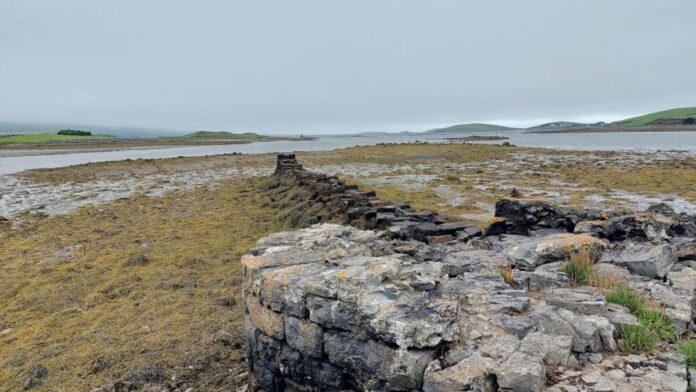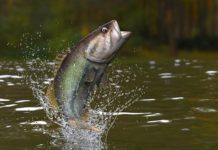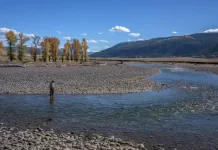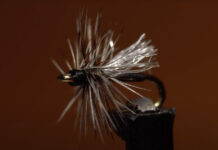Looking out on Clew Bay from the quay area in Westport.
By Tom Gillespie
THE following is a translation of an article which appeared in La Roche Independent, a well-known Parisian fishing magazine, in 1957, and was reprinted in The Connaught Telegraph in January 1958.
In August 1957 the author wrote: Clew Bay is situated to the north-west of Lough Corrib, a lake which is already familiar to our readers.
This bay, which resembles a rectangle, 25 kilometres long by 10 wide, is open to the west into the Atlantic and Clare Island.
This island occupies a third of the passage and breaks the great waves coming from the open sea.
This would be quite a consideration in itself, but the peculiarity of Clew Bay is that a third of it is taken up by an unbelievable number of little islands, each of which consists of only a few acres.
Hence these islands are separated by channels of from 100 to 500 metres in width, and varying in depth from 10 to 245 metres.
The difference in levels between high and low water at the spring tide being about seven metres, these narrow stretches of water are animated by a current, which varies in strength depending on the whether they are parallel or perpendicular to the direction of the tide, but which is extremely favourable for fishing.
Even during the worst storms, this labyrinth of little islands make an ideal refuge, because no matter where one anchors, one is always sheltered from the largest waves by one island or another.
We have noticed ourselves, because we fished there on an unusual stormy day.
We left Westport in the company of Mr. O’Malley, Mr. Staunton and three others from the local club, in a wind so violent that it was difficult to stand up on dry land, and, furthermore, the rain poured down in torrents.
After an hour’s sailing among the islands, we anchored in a spot well sheltered from a swell, about 100 metres from an island where there was a depth of 18 metres.
The wind changed all the time, blew sometimes in the direction of the current, and sometimes against it, so that the boat was constantly swinging and the chances of entanglement were great.
The pitching and rolling were bearable, so that, in spite of the storm, it was quite possible to fish.
Mr. O’Malley led off with a monkfish weighing about 35 pounds, which was quickly followed with a half-dozen skate, small according to our friends, but weighing 10 pounds each nevertheless, fine fish by our standards.
I myself fished with two hooks size 5/0, about one-and-a-half metres apart, each baited with a serious piece of fresh mackerel.
I had already caught a fine skate, then I had a very strong bite. I felt I had something worthwhile at the end of my line, because it was difficult to take it in, and from time to time I had to pay out.
At last I was able to shorten my line, and I could see the reason for the strong resistance for there was a 10-pound skate on the upper hook and a 46-pound monkfish on the lower hook.
The weather was a little better the next day and we were able to leave the maze of little islands and anchor at the entrance to Clew Bay, where shark and giant skate are caught, between Achill and Clare Island.
There, at a depth of 30 metres, we had a catch of skate and tope, which were light, according to the local anglers, but which we considered reasonable.
The following day a colleague from Liverpool caught a 20 pound skate.
Before returning to the harbour we made a short stop at Clare Island, disembarking opposite a friendly little public house, neat the ruin of an ancient stronghold which, in the 16th century, was the principle residence of Grace O’Malley, queen of the western sea.
Her legendary bravery earned her the title ‘Grace of the Heroes’ and her naval exploits have the same place in Irish history as those of Jean Bart in the history of France.
Since we were able to fish in Clew Bay in exceptionally bad weather, it is with complete confidence that we are organising a holiday there from the end of June to the beginning of July 1958.
The organisation of this excursion is very flexible, i.e. departure from Paris in a group, in order to avail of the cheaper rates, and the return journey to be made independently, according to each one’s convenience.
Our visit will coincide with the second Westport Angling Festival, lasting from June 30 to July 11.
Twelve days may appear long for a single competition, but this festival is actually a series of different competitions, so that a person who has only a little time at his disposal can take part in it with every chance of success.
The Westport festival is unlike other competitions in that it is more like a series of good fishing trips, in gay company and of great variety, during which one catches fish, which are unknown on the French coast, such as monkfish and halibut.
Thus, as one can see from a glance at the map, each one can pursue that branch of angling which suits him best.
Inshore, certain parts are very suitable for fishing for bass and pollock, conger eels and flatfish.
In the sheltered portion of the bay, among the little islands and as far as Clare Island, medium sized fish can be found, pollock, huss, dogfish, monkfish, skate, etc., up to 60 pounds weight.
Off Clare Island and Achill Island large fish are caught, some weighing many hundreds of pounds, giant skate, tunny, shark, halibut.
As proof of this we have the 1957 festival when 93 competitors caught 2,267 fish, a total of six tons. Countless fishing lines, in whole or part, were lost, and 14 rods were broken during the contest. The fish in Clew Bay are no laughing matter.
We have also anticipated the wishes of those who would like to vary their amusement by practising another type of angling, and for this it will be sufficient to give only one or two days notice.
In Lough Mask, where it is customary for two to fish in a boat, there are enormous pike, fine trout and perch. Types of angling allowed: fly, casting and trolling.
In little lakes near Westport, there are small trout that can be taken by fly; in the rivers near Louisburgh, one can get salmon and sea-trout but here fly-fishing only is allowed.
The main features of our tour have already been arranged by our Westport correspondent, Mr. T.P. Brennan, in attending to all the little details which are better regulated on the spot, such as accommodation, hiring of boats, and procuring bait.
NOTE: The article was written by Monsieur A.P. Decantelle, editor and proprietor of the magazine.
Credit: Source link































